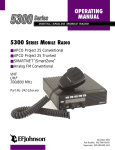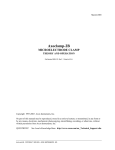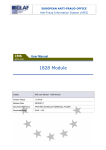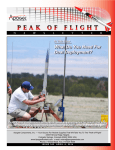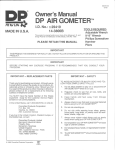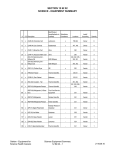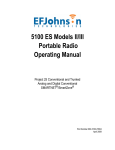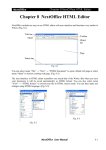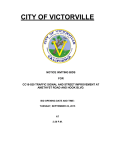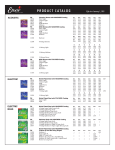Download N E W S L E T T E R
Transcript
I S S U E N E 8 7 W - A U G U S T S L E T 1 9 , T 2 0 0 2 E R Feature Plan: How To Make Your Own Custom Foam Nose Cones Delta III Rocket Hit: Add a Piece of Space History To Your Rocket Fleet Web Sites of the Week: How Do You View Old Rocketry Web Sites That Say "File Not Found?" Apogee Apogee News: News: Updated Product Catalog Is Coming Soon New RockSim User's Manual Now Available How To Select From Among Our Software Choices? Rocket Motor Update: When Will The Medalist Motors Be Back In Stock? Plus Product Reviews and Web Site Corrections 1 1 1 3300 EE l kkttoonn D Dr irviev,e S u s iut e i t AA 1 C C ,O C8O08900970 U7 S A Co o lloor a r ad do o S p S rpi n r g i ns ,g s w ww ww w .. A ap po og g eeeeRrooccke k test. sc o . cmo m oo rrddeer rs @ Aa ppooggeeeeR rooc ckek tes t. cs o. cmo m pP hh o n ee 771 9 1-95 -35 741- 9 503 4 - 9 0 5 0 on 5 -395 3 -39 5 3F 3 a x5 7 f1 a 9 -x5 3 9 0- 5 I S S U E 87 - A U G U S T 19 , P E A K O 2 0 0 2 F APOGEE F l I G H T Future Classic Kit: Add A Piece of Space History to Your Rocket Fleet No collection of scale model model kits is complete without the Apogee Delta III kit. It is a perfect desktop display model, since it doesn't take up a lot of room. When people walk by an see it, you can explain to them about rocketry, and how it truly mimics the real space program. America's middle-size workhorse is the Delta III rocket from the Boeing corporation. It can loft a satellite the size of a jeep SUV to 24,000 mile orbit above the earth. This 1/107th scale model faithfully details this rocket, and features:10 plastic nose cones, six small nozzles, three large canted nozzles, vacuum-formed plastic nose cone & transition section, water-transfer color decals, 45.7 cm (18 inch) diameter plastic parachute, and a plastic main-engine display nozzle with matching display stand. Also comes with scale data and photos of the real vehicle. This model can built as either a display model, or a real "flying model rocket" by attaching the die-cut balsa fins. Building it is pure pleasure; launching it is pure excitement. Delta III Rocket Kit P/N.5022 $35.00 Components web site: http://www.ApogeeRockets.com/ Delta_3_kit.asp Specifications: Skill Level 5 Length: 36.5cm (14.38 inches) Diameter: 46.0mm (1.81 inches) Weight: 50g (1.76 oz) Recovery Type: 18 inch preassembled plastic parachute Recommended 18mm diameter Rocket motors: A8-3 or A6-2 (first flight), B6-4, C5-3, C6-3, C10-5, D10-5 *Fins (included) are required for model rocket launch. F.Y.I. In the last ezine, we gave you the URL for a quicktime video of a large helicopter flight. It seems we got one letter wrong in the address, and the link didn't work. Here is the correct web site address to download the video: http://www.employees.org/~fty/apogee/video/ helicopter.mov You can order the rocket kit right now from the Apogee Archives of this Newsletter All t he articles that have appeared in this newsletter are archived at htt p://www.apogeerockets.com/education/newsletter_archive.asp 1130 Elkton Drive, Suite A Colorado Springs, CO 80907 USA www.A pogeeRockets.com orders @ApogeeRockets.com phone 719-535-9335 fax 719-534-9050 PAGE 2 I S S U E 87 - A U G U S T 19 , P E A K O 2 0 0 2 F Progress Report: the new Apogee catalog We're in the process of creating a new printed catalog. If you remember, the last catalog we produced was on a CDROM. Many people liked that format, but there were many others that missed being able to hold paper in their fingers. So we've put away the CD format, and we're going back to paper. One thing that always happens when I print a catalog is that people come back to me and say, "you have a typo on page such-and-such." So this time, I'm going to let you all have a chance to download it first. That way you can report back to me before I actually go ahead and print it up. I appreciate the reports, so please let me know of any errors that you see. The catalog isn't totally finished yet, but it is far enough along to let you pick through it. You'll see the one page that is still a little bit blank. You'll also notice that some of the prices are going up when the new catalog is printed. Maybe you'll have a little incentive to place your order now while the prices are lower. The pdf version of the catalog can be download at: http://www.apogeerockets.com/education/downloads/ apogee_catalog.pdf The file size is approximately 3.5 Meg. Apogee receives great reviews! We like it when an Apogee product gets a good review. So I thought I'd point out two of the ones that I noticed recently. They were both buried in articles published in the July/ August 2002 issue of Sport Rocketry magazine. The first one was about the new 1/70th scale Saturn 1B. On page 4, Tom Beach says: "The new Saturn 1B from Apogee is a very impressive kit. It is the same 1/70 scale as the legendary Estes kit of the 1970's, but even more detailed with its vacu-formed wraps and molded parts." - Photo included. On page 12, In an article titled: "Rocketry for College Recruitment Camps," Warren Benson writes: "The use of RockSim has proven to be an excellent education tool as young people can relate to it through popular computer games an then go on to actually build and fly their creations." APOGEE F l I G H T If you need to subscribe to Sport Rocketry magazine you can do so on the National Association of Rocketry's web site: www.NAR.org Motor Update! Recently, the NAR decertified the Apogee Medalist motors for contest use. There has been a number of questions from people what this means. It has caused a lot of confusion, and I hope to straighten it out. If you have a stockpile of the motors, you can still fly them. They will remain safety certified for a long time. But you cannot use them in NAR competitions. The reason for the contest decertification is that they are not generally available to all competitors. The NAR believes it would be unfair for one person to use them and not everyone. The reason they are not currently available is because Aerotech has not yet fully recovered from the fire they suffered last fall. The motors will be back! We fully intend to get new motors as soon as Aerotech gets their new facility up and running. However, there will still be a slight delay in their availability. From Aerotech's perspective, the small Medalist motors are a low priority item compared to their own high-power and reload motors. I understand this, and I'd take the same approach myself if I was in their shoes. The point I want to make is that there will be a delay in getting the motors, even if you hear that Aerotech is up and running at full production speed. AS SOON as we get word from Aerotech, we'll post the availability date on the Apogee web site (http:// www.ApogeeRockets.com/composite_motors.asp). It is not necessary to send us emails asking when we'll start shipping the motors. As soon as we know, we'll post it to the web site. If you don't see a date on the Apogee web site, you can assume that we still don't know the shipping date. But as I mentioned above, we will have motors again. It is just a matter of time. We thank you for your patience. When the motors do become available, and we start shipping motors again, the motors will again regain their NAR contest certification. That date will be 90 days after the date when the first new motors are shipped. We'll post that date on our web site so you'll know when they are legal to use in competition once again. 1130 Elkton Drive, Suite A Colorado Springs, CO 80907 USA www.A pogeeRockets.com orders @ApogeeRockets.com phone 719-535-9335 fax 719-534-9050 PAGE 3 I S S U E 87 - A U G U S T 19 , P E A K 2 0 0 2 O F APOGEE F l I G H T get a lot of requests for the unfinished chapters in the document. New rocksim user’’ s manual Paul Fossey has created a new .pdf version of the RockSim user's manual. You can download it free-of-charge from our web site at: http://www.apogeerockets.com/education/downloads/Rocksim_manual.pdf This new manual explains exactly what each button and setting does in RockSim. The old .pdf file is now being called the "How To Get Started Guide." This guide is only partially complete, but it does walk you by the hand through a simple rocket design. The guide has become a favorite among modelers because it takes you step-by-step through a basic RockSim design and simulation. And we know it has become a favorite because we If you'd like to write one of the unfinished chapters in the "How To Get Started Guide," please feel free to contact me. But hopefully with the two files (the User's Manual and the How To Get Started Guide), you'll have all the information you'll need to become a true RockSim expert user. Software News With all the great software that Apogee is now selling, it may be getting confusing for customers to decide which program they should buy. To make the decision easier, we've created a chart that lists the major features of each program. You can simply read down the chart and find which software will perform that task. Which Software Should You Choose? ROCKSIM ROCK SIM Do You Need? splash see pg 10 see pg 14 see pg 16 see pg 16 see pg 12 •Rocket Design: Create And Arrange The Parts •Simulation: Simulation: Find Out How High It Flies • •Where Where Will W Your Rocket ocket Land Downwind? •Where Where Will W Your Rocket ocket Land Crosswind? •Weight, CG And Optimum Mass Prediction P •Print Out Patterns For Parts • •Graph Graph Out Simulation Data • • • •CP Prediction Below Mach 1 •CP Prediction Above Mach 1 •Visualize The Airflow Over The Rocket • • • •Predict Base Drag •Drag Prediction Below Mach 1 •Drag Prediction Above Mach 1 • • • •Design Re-Entry Vehicles •Put Your Rocket Into Orbit •Predict Fin Flutter Velocity •Will The Fins Be Stripped Off By Flight Forces? • = good results = best results www.ApogeeRockets.com 1130 Elkton Drive, Suite A Colorado Springs, CO 80907 USA www.A pogeeRockets.com orders @ApogeeRockets.com phone 719-535-9335 fax 719-534-9050 PAGE 4 I S S U E 87 - A U G U S T 19 , P E A K O 2 0 0 2 F APOGEE F l I G H T Web sites of the week The WayBack Machine One of the problems that I've discovered with the educational section of the Apogee web site (http:// www.apogeerockets.com/education/) is that the linked sites that I've listed are constantly changing. Not only do they change, but a lot of times they drop out completely and when you click on the link, you get the dreaded "404 Error - File Not Found." There are many reasons that the sites have changed. For example, the site owner may have been using free server space which is now no longer free. They may have switched to a new server and didn't leave us any clue to the new site. Or they forgot to renew their site domain name. It is possible that it just got too hard to maintain their site and they've decided to scrap the whole project. But I found a nifty web site that continually archives individual sites. It is called the "WayBack Machine" (http:// www.archive.org/). What it does is allow you to find old web sites that are no longer listed on the internet. It gets you past those "file not found" error messages. The WayBack Machine gives new life to dead links that you may find on the Apogee Educational site. What you'll need to do is copy the URL name from our site, and then go to the WayBack Machine. When you get there, simply paste the URL into the appropriate slot. The WayBack machine will then come back with a listing for the web site, and how many times that particular page changed over time. For example, if the site owner added a new block of text on the site, the WayBack Machine will give you links to the older version, as well as the newer one. I personally start at the most recent, and then work backwards to the older ones if it doesn't contain the information I was looking for. Like I said, the WayBack machine will allow you to view F.Y.I. those old web sites that are no longer in existence, and makes doing web research less painful. The only drawback is that I didn't notice that it archived the images on the pages. But at least you get to see the text. I still rate it a five-star web site for the usefulness that it offers. Here is an example so you can give it a try right now. There was one web site that everyone seems to miss tremendously. That site was produced in the late 1990s by Mac McGarrigle, and it featured his lifting body rocket gliders. Every now and then, people on rmr ask about what happened to it. The site is gone, but the Way Back Machine has a copy of it. While you can't see the pictures, all the text is there. http://web.archive.org/web/*/http://www.phoenix.net/ ~rocket/mac.html ---------Imitation is the Sincerest Form of Flattery: "Apogee's Model Rocket Education Guide" http://www.ApogeeRockets.com/education/ I didn't realize how useful the "Education Guide" on the Apogee Components web site has become. That is, I didn't realize this until I started seeing it duplicated by other web sites. I started the educational section in the Spring of 2000. I wrote about it in Apogee E-Zine Newsletter #7 after I first posted it on our web site (http://www.apogeerockets.com/education/newsletter07.asp). I created the site because I wanted a place where teachers and youth-group leaders could go to find a one-stop listing of sites that specifically had information about using model rockets as a teaching tool. It took a long time to create the education guide, because I had to look up each site individually and decide whether or not the information it contained would be useful for teachers. Then I had to categorize each site by topic, and write a short description about what it contained and why it might be useful to teachers. Apogee's Model Rocket Education Guide is a unique web cont. on pg. 6 1130 Elkton Drive, Suite A Colorado Springs, CO 80907 USA www.ApogeeRockets.com orders @ApogeeRockets.com phone 719-535 -9335 fax 719-534-9050 PAGE 5 I S S U E 87 - A U G U S T 19 , P E A K 2 0 0 2 O F APOGEE F l I G H T Web sites of the week cont. from pg. 5 site, because it is grouped by topic. So a teacher that has a question about —say— rocket parachutes, can go to the site and click on the "recovery devices" link, and find a list of other web sites that have useful information about making parachutes for model rockets. They can then read a short description of those sites, and pick the one that best suits their needs or grade level. I have been continuing to add links to it since then as I've come across interesting rocketry sites. If you have a site with educational information on it, and would like me to link to it, be sure to send me the web address. My email is: [email protected] Anyway, as I was doing research to add new sites to the educational guide, I discovered that there were a few people that were simply taking my work, and posting it on their own web sites. Instead of just grabbing the text from our site, I prefer that they just put a link from their web sites directly to the Model Rocket Education Guide. I know it is a sincere form of flattery to be imitated. But it would make me more inclined to make the site even better if I knew that I would be rewarded with visitors. That is why it touches me in a prickly way. I put a lot of effort to attract visitors to my site with unique and useful information. But people searching for the information aren't getting to my site because they found my stuff on someone else's site first. In effect, I put a lot of effort into the project, but someone else is reaping the benefits. I don't like giving these people any traffic to their sites, but if you'd like to see what I'm talking about, compare the links these web sites have to those on Apogee's Model Rocket Education Guide page. http://www.rocketsforschools.com/teachers/index.html http://users.chariot.net.au/~a_q/lessons/ Here's what you can do to help me out and thwart those people that are gaining visitors off our efforts. And it is real simple to do. Just put a link on your web site to the Apogee Model Rocket Education Guide. They don't want people coming to the Apogee site, so when you recommend to them that they do (with a link on your own site), it makes my site just a little easier to find. If you don't have a web site, then tell your friends to sign up to receive this free e-zine newsletter. I do appreciate your support. To conclude, I've come to the conclusion that the educational information on the Apogee web site must be pretty great. Otherwise those other sites wouldn't bother swiping the information. Check it out for yourself if you haven't already seen it. The Pendulum Rocket Fallacy http://www.geocities.com/jim_bowery/pendrock.html This is a neat little web site by Jim Bowery is worth visiting, even though the top-most image is over 300K in size which can make it download slowly if you have a dial-up modem. But the information is good, and the animated gif images really help to simplify the complex subject of rocket stability. The site takes a look at rocket without fins that have the motor mounted near the top. For example, a firework skyrocket or Robert Goddard's first liquid propellant rocket. It talks about why these types of rockets can be very dangerous to fly (Goddard's rocket went unstable too). The other thing this site looks into is a fallacy that many people new to rocketry have. They don't know the relationship between the CP and the CG of the rocket. They think that if the rocket is heavy at the back end, that it will swing like a pendulum and self stabilize. One person thought that the Apogee Components Delta III kit (http:// www.ApogeeRockets.com/Delta_3_kit.asp) would be stable without fins because it was heavier in the back than it is in the front. As you experienced rocketeers know, the position of the rocket's CG is critically important. If it is in the wrong location, the rocket will go unstable. This web site illustrations this concept beautifully. If you have a web site that is geared toward educating other modelers, and would like us to review it, send me an email at: [email protected] 1130 Elkton Drive, Suite A Colorado Springs, CO 80907 USA www.ApogeeRockets.com orders @Ap ogeeRockets.com p hone 719-535-9335 fax 719-534-9050 PAGE 6 I S S U E 87 - A U G U S T 19 , P E A K O 2 0 0 2 F APOGEE F l I G H T How to make your own foam nose cones! Plan by: Michel Demey (Bruxelles, Belgium) email: [email protected] Illustrations by: Shrox When making your own rockets, do you find you never have the right size nose cone to fit the tube? Here is a simple little plan by Michel Demey that shows how to build a simple fixture to carve your own nose cones from blocks of EPS (expanded polystyrene) foam. The advantage is that styrofoam is dirt-cheap, and it can be found in almost any household. Nearly every electronic device is shipped in a oversize foam block for protection, which you can now convert into rocket nose cones. You can even laminate smaller chunks of the foam together with some light coats of spray adhesive to make really big nose cones. Plus, this fixture is simple to build and can be made out of the scrap wood you have in your box of rocket supplies. Making foam nose cones should cost you nearly zilch to make! To make the foam nose cones, you'll be carving them to shape with a special fixture and a "hot wire foam cutter." First we'll describe the special cutting fixture. As you can see in the pictures, there is a rotating plate and two side templates. These will all be made out of wood. The side templates have the profile of the nose cone shape. We use only 1/2 of the profile so you can start cutting at the same point on the tip every single pass of the hot wire 'knife.' That is why there is a straight section extending from the tip of the nose. You can use RockSim to print out the nose profile you want, and then draw the rest of the template around it on the same sheet of paper. You'll need to make two duplicate side templates. There is a spacer plate at the bottom of the fixture. It should be made out of a large block of wood so that it doesn't distort as you're using the cutter. A large block of scrap balsa will work fine. Make sure the length of the block is about double the diameter of the nose cone you intend to make. This will allow you to put a rough-hewn chunk of foam into the fixture -- in other words, you don't have to start with a cylinder shape foam piece as shown in the illustrations. on top of the spacer block will be a rotating base plate. The size of the nose cone you intend to make will determine how you make the pivot for the base plate. If it is a small nose cone, you can use a pin stuck through both the base plate and into the spacer block. The pin will act as the axle so you can rotate the base plate. For bigger nose cones, you'll probably have to attach a wood dowel to the bottom side of the base plate, and pass this through a hole in the spacer block. You'll need this larger diameter axle to pivot the larger block of foam. I'm sure you're pretty innovative, so I'll leave the details to you. How To Use The Fixture Stick a block of styrofoam to the rotating plate with a double sided tape. Make sure the block of foam and the base plate will rotate freely in the fixture. You may need to trim off the corners of the foam block to allow it to turn between the side plates of the fixture. The trimming of the foam is done with a hot wire foam cutter. There are many places on the internet where you can find free plans for hot wire foam cutters. So I won't go into details of this tool. If you don't have one, try a search at your favorite search engine, or try one of these sites: http://members.fortunecity.co.uk/slmohr/rcinterest2.htm http://www.public.iastate.edu/~orman/air/cutter/hotwire.html h t t p : / / w w w. c h a r l e s r i v e r r c . o r g / a r t i c l e s / t o o l s / brengmancutter.htm After heating up the wire, you'll lay the taunt wire on the straight section at the top of the side templates. As you touch the foam with the hot wire cutter, it will quickly melt the foam. So push the wire down against the edges of the wood side plates so you can control the direction of the cut. Then just follow the curvature of the template with the hot wire. When you reach the base, just pull the wire away from the foam to remove the excess. Then turn the base plate with your hand slightly and make another pass with the hot wire cutter. Continue to rotate the base plate and cut with the hot wire. After 5 minutes, you'll have a good custom nose cone. After cutting and removing the foam nose cone from the fixture, you can coat the outside with some water-based filler 1130 Elkton Drive, Suite A Colorado Springs, CO 80907 USA www.ApogeeRockets.com orders @ApogeeRockets.com p hone 719-535-9335 fax 719-534-9050 cont. on pg. 8 PAGE 7 I S S U E 87 - A U G U S T 19 , P E A K O 2 0 0 2 F APOGEE F l I G H T How to make your own foam nose cones! cont. from pg. 7 putty and sand it smooth. It can become nearly perfect with a little bit of effort. For bigger nose cones, lay up some fiberglass and epoxy, and you'll end up with a light-weight and hard-as-nails nose cone. The fixture can be scaled up to make any size nose cones! And hot wire foam cutters are easy to make if you don't want to buy one. If you like this plan, be sure to send Michel a note of appreciation! Make sure the foam can rotate freely between the side plates Mount the plug of foam to the rotating base plate with double-sided tape. Fire up your hot wire foam cutter, and use the side templates to guide the wire as you cut through the foam. Rotate the nose slightly, and repeat this cutting procedure. Make sure to keep the wire moving, or you could melt a divot into the side of your nose cone. With enough passes of the wire, the nose cone will come out nearly perfect and is ready for finishing. 1130 Elkton Drive, Suite A Colorado Springs, CO 80907 USA www.A pogeeRockets.com orders @ApogeeRockets.com phone 719-535-9335 fax 719-534-9050 PAGE 8











